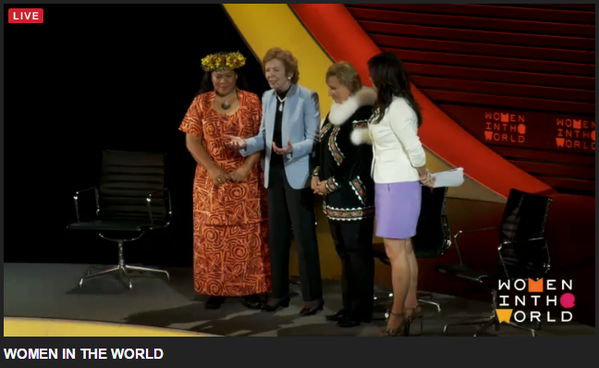Tina Brown’s Women In The World Summit is having a worldwide impact unimaginable six years ago when it started in a small midtown Manhattan hotel ballroom with 500 people.
In her third year, her conference moved into the massive Koch Theater in Lincoln Center and we heard from courageous women fighting against repressive male leaders, such as Ellen Johnson-Sirleaf, first elected female head of state in Africa.
This year Tina Brown scored a great coup. Her new partner is The New York Times, which has taken over the burden of sponsoring this year’s summit. Tina is virtually blowing the roof off this vast theater with 3,000 attendees stacked up to the third ring.
This morning’s poignant panel on efforts to recover the “Gone Girls” still in the clutches of Boko Haram was followed by “Everyone’s Problem” – a panel moderated by the brilliant Valerie Jarrett on the desperate need of working mothers for affordable childcare. Moms need this whether they work in an office that rewards them according to the number of hours they are present, or working from home with little ones crying for attention: help in caring for children and for elderly family members as they decline in health.
But the panel that brought us up short asked a terrifying question. “What do you do when your world disappears?”
Mary Robinson, the feisty Irish grandmother, former President of Ireland and now UN Special Envoy on Climate Change, began with the bad news: “Everything is changing for the worst” in our Earth’s atmosphere. The existential threat is producing a secondary crisis that most of us have not even yet considered.
Climate refugees.
“In 30 years, we could have 230 million climate displaced,” former President Robinson told a stunned crowd. She made the case for a human rights policy to deal with these unexpected and unwanted displacements of people from communities, a huge proportion of which never even used carbon fuel.
Sitting next to Robinson, was a heavily furred Alaskan woman, Patricia Cochran, who talked about lives and houses literally disappearing into the ocean.
“85% of our coastal communities are threatened,” said the executive director of the Alaska Native Science Commission. “It’s taken science a long time to recognize what we have been facing in Alaska for the last 50 years.” She talked about natives today who go out to hunt or fish on the ice, and drown.
“When you talk about ‘migration’ in Africa, it’s unthinkable for families and tribal communities that live as a unit,” said Pelenise Alofa, coordinator of a Climate Action Network. People will have to be prepared emotionally. She said there are projects attempting to prepare people now for vocations that they could pursue once they become climate refugees. But do they have rights?
All the scientists are telling us that we are not on track. We have virtually moments before the catastrophic effects of climate change become irreversible. Robinson was asked what levers need to be pulled. She said we all must come together as women — because she sees this as a women’s issue — as communities, cities, countries, and human beings sharing a delicate planet, and do our part.
Finally, she brought all 3,000 in the house to our feet and put the fear of God into us: “We are the first generation to understand the seriousness of climate change, and the last generation able to do something about it.”



0 Comments